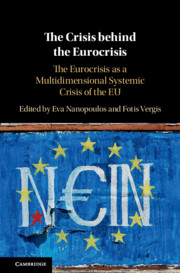Book contents
- The Crisis behind the Eurocrisis
- The Crisis behind the Eurocrisis
- Copyright page
- Dedication
- Contents
- Contributors
- Preface
- Acknowledgements
- Introduction The Elephant in the Room
- 1 There Is No (Legal) Alternative
- Part I The Crisis as a Crisis of the EU’s Identity
- Part II The Crisis as a Crisis of the EU’s Political and Democratic Legitimacy
- Part III The Crisis as a Crisis of the EU’s Economic Model
- Part IV The Crisis as a Crisis of the EU’s Social Character
- Part V Joining the Dots and the Way Forward
- Index
1 - There Is No (Legal) Alternative
Codifying Economic Ideology into Law
Published online by Cambridge University Press: 07 July 2019
- The Crisis behind the Eurocrisis
- The Crisis behind the Eurocrisis
- Copyright page
- Dedication
- Contents
- Contributors
- Preface
- Acknowledgements
- Introduction The Elephant in the Room
- 1 There Is No (Legal) Alternative
- Part I The Crisis as a Crisis of the EU’s Identity
- Part II The Crisis as a Crisis of the EU’s Political and Democratic Legitimacy
- Part III The Crisis as a Crisis of the EU’s Economic Model
- Part IV The Crisis as a Crisis of the EU’s Social Character
- Part V Joining the Dots and the Way Forward
- Index
Summary
The purpose of this chapter is to further explore the nature of ‘crisis’, and how the incorporation of an economic ideology as ‘solution’ to that crisis in the form of legally binding obligations restricts the ability to pursue alternative courses of action, creating tensions within society. Focusing upon economic doctrine as reflecting ideological positions, the authors consider the way in which the framing of events as ‘crises’, and thereby establishing them as threats to the current political and economic system, enables political actors to facilitate changes that may not otherwise be politically feasible. In particular, by responding to a crisis through the creation of laws that codify an ideologically guided economic doctrine, a temporary state of crisis creates a permanent legal set of obligations. By doing so, prevailing (if not altogether hegemonic) political actors are able to delegitimise alternatives to that economic doctrine as falling outside of the rule of law: there is no legal alternative but to follow that legal obligation.
- Type
- Chapter
- Information
- The Crisis behind the EurocrisisThe Eurocrisis as a Multidimensional Systemic Crisis of the EU, pp. 23 - 48Publisher: Cambridge University PressPrint publication year: 2019
- 3
- Cited by



